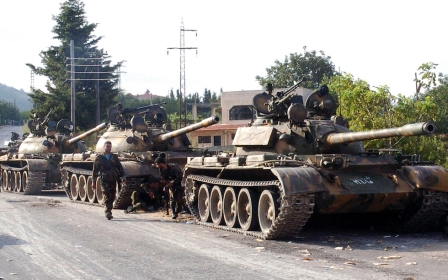Israel softens tone on Assad but threatens Syrian troops near Golan
Israel held out the prospect of eventual contact with Syria under President Bashar al-Assad's rule, in a nod to pro-government forces recapturing most territories held by rebels over the seven-year-old civil war that Israeli officials had initially predicted would topple him.
Russian-backed government forces have advanced in southwest Syria and are on course to reach Quneitra, a rebel-held district abutting the Golan Heights frontier with Israel.
The military campaign has raised Israeli concerns that Damascus may try to deploy troops there in defiance of a 1974 UN demilitarisation accord on the Golan.
Touring the Israeli-occupied Heights on Tuesday, Defence Minister Avigdor Lieberman ramped up threats to use armed force should Damascus's forces encroach.
"Any Syrian soldier who will be in the buffer zone risks his life," Lieberman told reporters.
However, Lieberman appeared to signal acknowledgement that Assad would regain control of the Syrian side of the Golan.
Asked by a reporter if he anticipated a time when the Quneitra crossing would be reopened under the UN-monitored armistice between Israel and Syria, and whether the two old enemies could establish "some kind of relationship," Lieberman said: "I reckon we are a long way from that, but we are not ruling out anything."
The Golan Heights was illegally captured by Israel in 1967 and annexed in 1981. In May, an Israeli official said Washington was considering recognising Israeli sovereignty over the Israeli-occupied Syrian territory.
Lieberman's remarks could foreshadow a more open approach to Assad ahead of Israeli Prime Minister Benjamin Netanyahu's Syria talks with Russian President Vladimir Putin in Moscow on Wednesday.
Israel has carried out scores of air strikes on suspected Iranian or Hezbollah deployments and arms transfers in Syria, seeing these as a greater threat than Assad and warning him not to abet them.
Netanyahu cautioned both Iran and Syria after talks in Jerusalem on Tuesday with Russia's envoy to Syria, Alexander Lavrentiev, and Russian Deputy Foreign Minister Sergei Vershinin.
"At the meeting [with Putin], the prime minister will make clear that Israel will not tolerate military entrenchment by Iran or its proxies anywhere in Syria, and that Syria must abide meticulously by the 1974 separation agreement," an official Israeli statement said.
Middle East Eye propose une couverture et une analyse indépendantes et incomparables du Moyen-Orient, de l’Afrique du Nord et d’autres régions du monde. Pour en savoir plus sur la reprise de ce contenu et les frais qui s’appliquent, veuillez remplir ce formulaire [en anglais]. Pour en savoir plus sur MEE, cliquez ici [en anglais].




